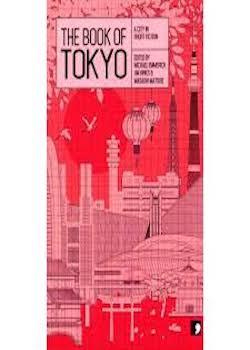The Book of Tokyo: A City in Short Fiction

Edited by Michael Emmerich, Jim Hinks and Masashi Matsuie
Comma Press (26 April 2014)
224 pages
ISBN-10: 1905583575
Review by Annabelle Sami
I had high hopes for The Book of Tokyo. I expected from the title something of a literary tour through the city, or at the very least, interesting and idiosyncratic snapshots of Tokyo city life, atmospheric vignettes.
However, the stories within the collection fail to convey a sense of place, which is after all the pulling power of the book, with enough clarity to make them enlightening in this regard to a British reader. The likely audience for this book will surely be expecting to be able to ‘discover’ Tokyo through this selection of short stories by ten different authors. Certainly, its emphatic title and stylish front cover highly resemble a tour guide (to the extent that one man on the tube asked me if I was preparing to visit Japan.)
However the stories are too general to make them stories about Tokyo. It feels as if some of them deliberately avoid mentioning street names or locations, and so they become more like insights into contemporary Japanese life than anything else. The mood of the stories is often that of introspective contemplation. Characters constantly reminisce, trapped in their own internal worlds, and this often leaves their external world – Tokyo – unmentioned.
The most disappointing factor was that the majority of the stories were rather uneventful, lacking the narrative arc that readers might expect of a self-contained work of fiction. In particular ‘Vortex’ by Osumato Hashimoto and translated by Asa Yoneda was quite dull and monotonous as the main character reflects on her life – something that seems odd to attempt in a short story.
The collection peaks early, its highlight the pairing of editor Michael Emmerich’s introduction and the first story ‘Model T Frankenstein’ by Hideo Furukawa and translated by Samuel Malissa. In his Introduction, Emmerich describes Tokyo as having ‘a sense of disorientation that blends seamlessly into a seemingly opposite sense of rootedness.’ This was mirrored well in Furukawa’s story whose peculiar abstractness juxtaposed the insistency with which the author specified particular Tokyo locales. However, this is the one notable exception to an otherwise underwhelming book. The Book of Tokyo remains simply a good way to sample the writing styles of ten contemporary Japanese writers. Sadly, its claim to being ‘A City in Short Fiction’ is open to question.
Other authors and stories included in this collection:
‘Picnic’ by Kaori Ekuni
‘A House for Two’ by Mitsuyo Kakuta
‘Mummy’ by Banana Yoshimoto
‘The Owl’s Estate’ by Toshiyuki Horie
‘Dad, I Love You’ by Nao-Cola Yamazaki
‘Mambo’ by Hitomi Kanehara
‘The Hut on the Roof’ by Hiromi Kawakami
‘An Elevator on Sunday’ by Shūichi Yoshida

